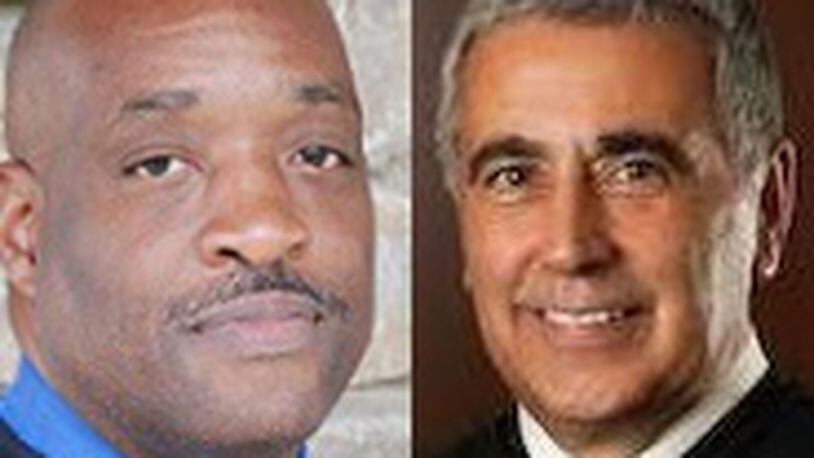Check out the rest of their responses and learn more about other candidates and issues on your ballot at vote.daytondailynews.com.
Q: What is your opinion of the recent Ohio Supreme Court ruling that juvenile convictions should not enhance penalties those defendants face as adults?
Tony Capizzi: Juvenile courts were first established in 1899, when legal doctrine established the principle that children are not simply "little adults." A separate "civil court" was created as an alternative to considering children's actions to be "criminal" in nature.
Therefore, although juveniles receive some of the same due process protections as adults, overall the purpose of an adult criminal conviction and a juvenile adjudication are vastly different. In many cases because we are a therapeutic court working to rehabilitate a youth, young offenders admit responsibility upon the advice of counsel without a trial, thereby allowing services to be immediately provided to the youth.
If juvenile convictions were allowed to enhance adult penalties, there likely would be fewer pleas entered, meaning more trials in juvenile court and delayed treatment for youth. While an individual must be held accountable for their actions, we would effectually be holding children to an adult standard if their actions as a child were able to automatically enhance the penalties faced in adult court.
Such a result is contrary to public policy and the scientific evidence regarding the maturity level of juveniles. It should be noted that the decision of the Ohio Supreme Court in State v. Hand is applicable in the adult court system. If I were called upon to serve on an adult case where this issue was present, I would follow the holding of our Supreme Court.
C Ralph Wilcoxson II: The Supreme Court based its decision not to enhance on what has historically been the unique difference between and adult conviction and a juvenile adjudication. Juveniles are not afforded the same due process safeguards that exist in adult proceedings.
Additionally juveniles are not found guilty, as in adult court, but rather are adjudicated responsible as the goal of juvenile court was to move the juvenile into a rehabilitative environment. Further in most cases a juvenile does not have the right to a jury trial and the safeguards that apply therein.
The historically different goals of the juvenile justice system and adult criminal justice system have resulted in significantly fewer procedural safeguards for juveniles Juvenile adjudications do not seek and are not meant to establish guilt or innocence, but rather to determine what is in the best interest of each child.
Furthermore, social factors may influence a juvenile’s disposition, which traditionally have not been considered punishment.
The two systems do not compare apples to apples and as a result of the significantly different goals of the adult and juvenile systems it would be disastrous if juvenile convictions were allowed to enhance adult sentencing. I agree with the Supreme Court’s majority decision.
Q: Should juvenile offenders, especially violent ones with convictions, get to have their names out of public records because they are juveniles?
Tony Capizzi: Yes. While I understand the value in holding a juvenile responsible for their actions and protecting the community, society is ultimately better served by maintaining the confidentiality of juvenile records.
I would note an exception exists for certain adjudicated juvenile sex offenders in Ohio. Juvenile courts, as therapeutic courts, are unique by focusing on the rehabilitation of youth and not simply punishment.
Identifying and maintaining the delicate balance between what is best for the juvenile in terms of their psychological development and the safety and security of the community is challenging and often controversial.
If the names of juvenile offenders were to be made public, rehabilitation would be more difficult to achieve. These children have more than likely experienced multiple forms of trauma. Allowing the names to be made public record would expose those youth to public danger, scorn, ridicule, and bias.
These youth are often already dealing with feelings of shame, weakness and helplessness. Studies confirm that children are more susceptible to lasting harm from humiliation and shame than adults. A lack of self-identity and/or a feeling of no community support also contributes to further deviant behavior.
Quite simply, treating a child like a criminal perpetuates further harm both to the child and to the community. We must always be mindful that the ultimate goal is to restore these youth to the community as productive, law-abiding citizens.
Children that find themselves in the juvenile justice system are not inherently “bad” children. Many simply lack guidance and an understanding of appropriate social behavior. These youth need time to mature. The protections afforded to youth by the juvenile justice system are in place to enhance the opportunity presented to our youth for long-term, continued success.
C Ralph Wilcoxson II: Yes, unless they are transferred into the adult system their identity should remain protected. If transferred to the adult system then adult rules apply.
The underlying philosophy of the juvenile system itself was to protect the child, through both its focus on treatment and its less decriminalized procedural terminology. Publishing the identity of these youth will criminalize them contrary to the legislative intent and the foundation of the purpose clause.
Specifically the clause states: The sections in Chapter 2151. of the Revised Code, with the exception of those sections providing for the criminal prosecution of adults, shall be liberally interpreted and construed so as to effectuate the following purposes:
(A) To provide for the care, protection, and mental and physical development of children subject to Chapter 2151. of the Revised Code, whenever possible, in a family environment, separating the child from the child’s parents only when necessary for the child’s welfare or in the interests of public safety;
(B) To provide judicial procedures through which Chapters 2151. and 2152. of the Revised Code are executed and enforced, and in which the parties are assured of a fair hearing, and their constitutional and other legal rights are recognized and enforced.
About the Author
